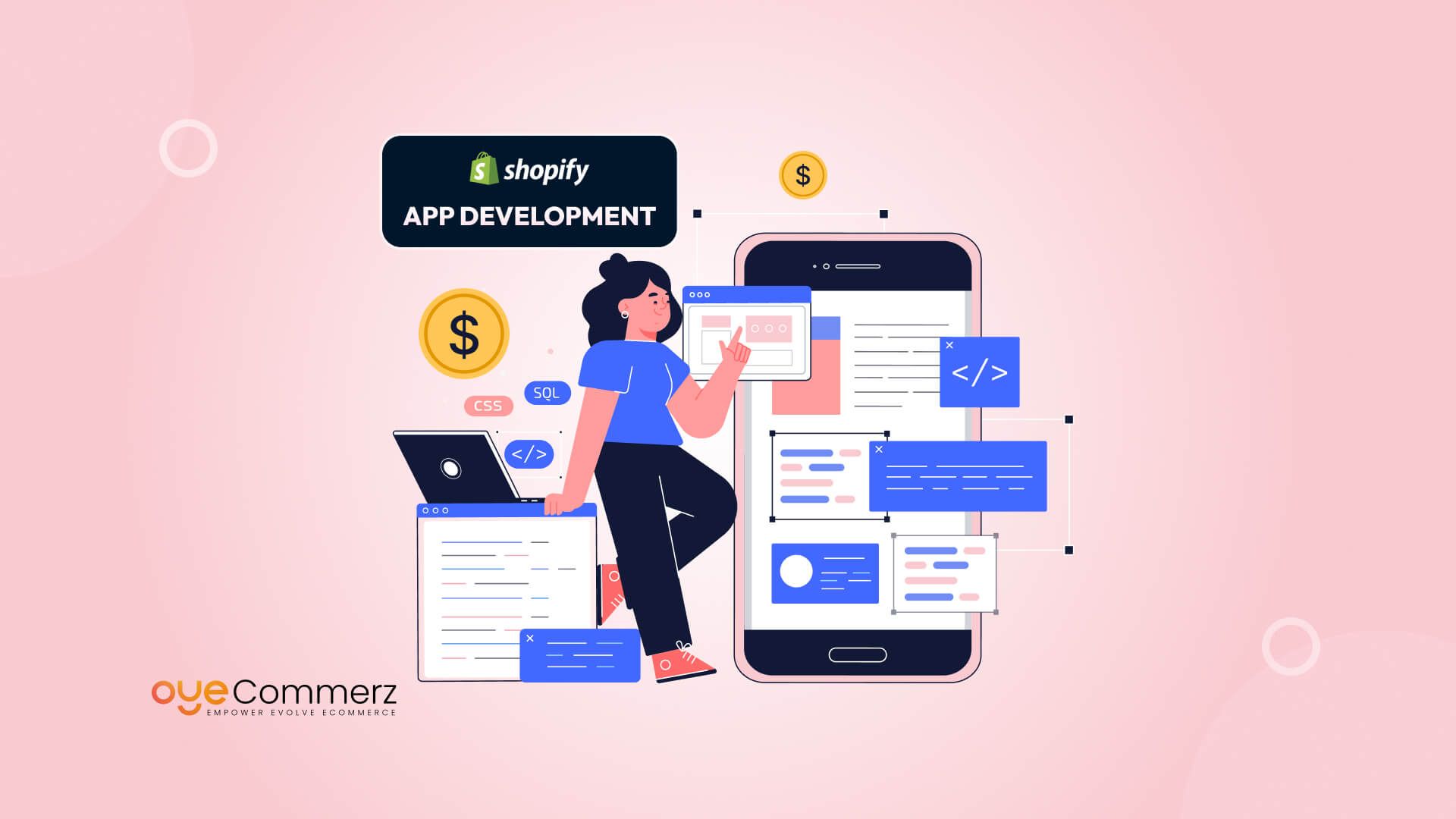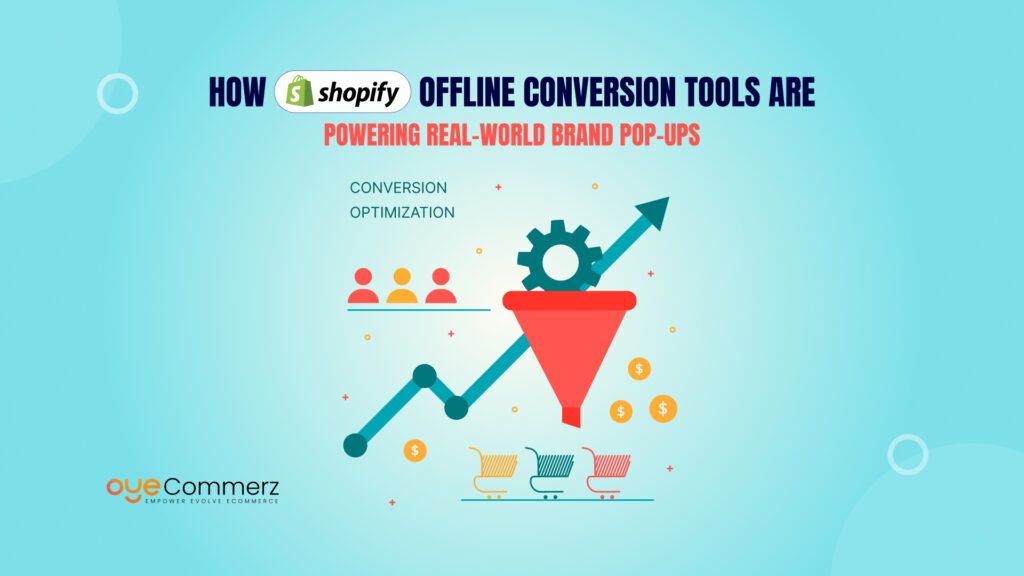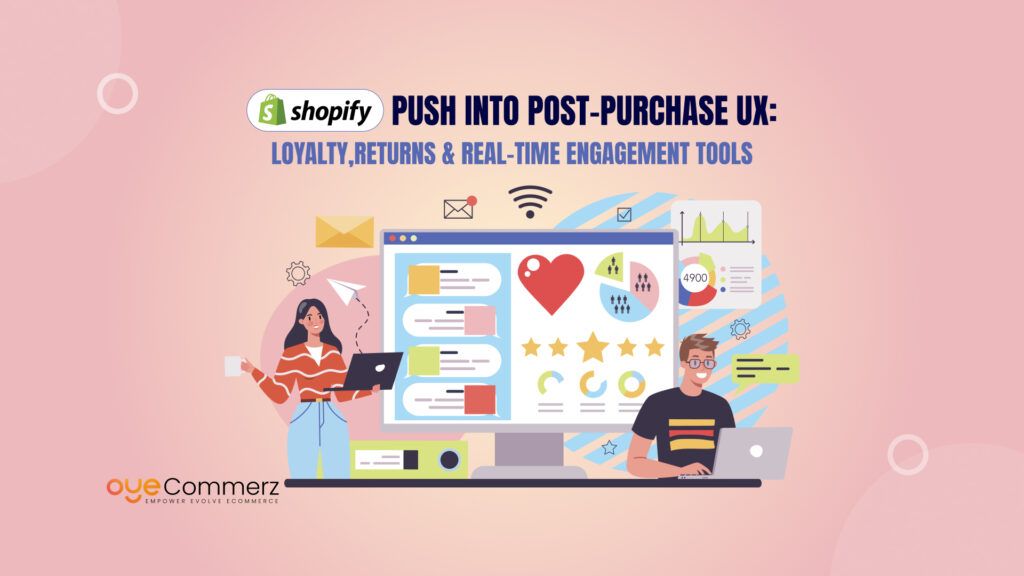Simply having an eCommerce store isn’t enough, you need a smart, seamless, and scalable solution. While Shopify offers an incredibly robust platform out of the box, true growth often demands more than just the basics. Businesses looking to scale, stand out, and simplify their operations are increasingly turning to tailored solutions that go beyond templates and standard tools.
That’s where Shopify App Development steps in. Whether it’s enhancing the customer journey, automating day-to-day operations, or integrating with third-party systems, customized apps unlock a whole new layer of potential. They allow businesses to meet unique needs, respond faster to market trends, and ultimately, increase profitability.
This blog explores how businesses, whether startups or scaling giants, can use the power of well-built Shopify apps to boost both revenue and efficiency. If you’re aiming to optimize your eCommerce presence, you’re in the right place.
Table of Contents
ToggleUnderstanding Shopify’s Ecosystem
Shopify has grown to become one of the most trusted eCommerce platforms in the world. Its core strength lies in its ability to let entrepreneurs and businesses set up online stores quickly, with minimal technical hassle. With features like customizable themes, secure payment gateways, inventory management, and multichannel selling, Shopify provides a comprehensive base for online retail. But while these features serve the general needs of sellers, eCommerce has evolved, and with it, the demand for greater functionality.
This is where Shopify App Development starts to make a difference. As consumer expectations grow and competition intensifies, businesses require smarter, more responsive systems. Shopify apps extend the core platform’s capabilities, making it easier for merchants to personalize customer experiences, automate routine tasks, and connect to external tools and services. There are thousands of apps in the Shopify App Store—ranging from marketing and SEO tools to shipping calculators and loyalty programs.
However, off-the-shelf apps can only go so far. Each business is unique in its goals, operations, and customer base. That’s why many store owners now choose to invest in custom app development—to gain functionality tailored specifically to their needs. Whether it’s syncing with a niche supply chain tool or offering a distinct checkout experience, customization enables stores to function exactly as required.
Key Points:
- Shopify’s core features: Storefront design, inventory, payment gateways, shipping integrations.
- Shopify App Development: Adds advanced capabilities not available out of the box.
- Apps matter because:
- They fill functional gaps.
- They scale with business growth
- They offer a competitive edge.
- They fill functional gaps.
- Why customization?
- Businesses differ in workflow, audience, and goals.
- Pre-built apps may not cover industry-specific or brand-specific requirements.
- Custom development ensures better control, integration, and ROI.
- Businesses differ in workflow, audience, and goals.
In short, Shopify offers the foundation, but it’s the ecosystem of apps that unlocks a store’s full potential.
The Revenue Engine: How Shopify Apps Directly Drive Sales
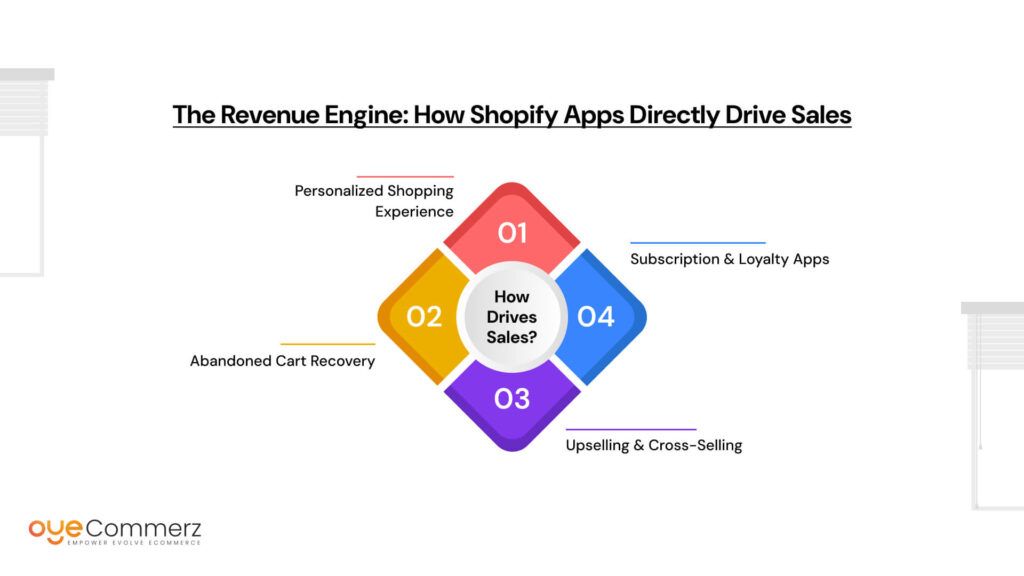
While setting up a store is step one, making it profitable is where the real game begins. With rising customer expectations and increasing competition, every aspect of the buying journey must be optimized for conversions. That’s exactly what well-crafted Shopify apps can do, they serve as powerful tools to enhance revenue without inflating costs.
Let’s explore how different app functionalities contribute to higher sales:
Personalized Shopping Experience
Modern consumers expect a personalized journey. Shopify apps use browsing behavior, purchase history, and AI to offer smart product recommendations and curated collections.
- Increased relevance = higher conversion rates.
- Apps like personalized search filters and “You May Also Like” sections keep users engaged.
Abandoned Cart Recovery
On average, over 70% of online shopping carts are abandoned.
- Shopify apps help recover lost sales by sending automated follow-up emails, SMS reminders, or push notifications.
- Many even offer incentives like discount codes to close the sale.
Upselling & Cross-Selling
Boosting average order value (AOV) is one of the easiest ways to increase revenue.
- Apps can show complementary products during checkout.
- Smart bundles and limited-time upgrades encourage quick decisions.
Subscription & Loyalty Apps
Returning customers spend more and are easier to convert.
- Loyalty programs, point systems, and membership tiers encourage repeat purchases.
- Subscription apps ensure recurring revenue for products like cosmetics, pet food, or coffee.
Shopify App Development allows these features to be fine-tuned specifically for your brand. Instead of using generic templates, businesses can align app functions with customer preferences, seasonal campaigns, and even regional behaviors.
This kind of customization doesn’t just drive more sales, it drives smarter sales.
Operational Efficiency: Doing More with Less
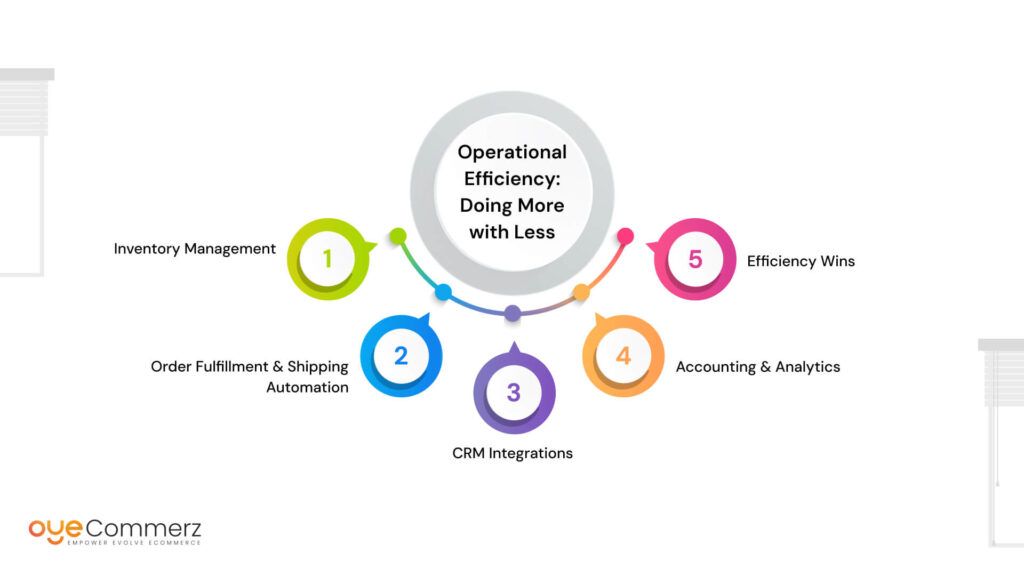
Behind every successful eCommerce store is a well-oiled machine. Speed, accuracy, and automation are key to maintaining smooth operations, especially as order volumes grow. Shopify apps help businesses not only survive but thrive by minimizing manual work and maximizing output.
Let’s dive into the operational impact of Shopify App Development:
Inventory Management
Managing stock across multiple channels can be chaotic without the right tools.
- Apps provide real-time inventory updates, low stock alerts, and automatic restocking workflows.
- Integration with warehouse and POS systems prevents overselling and stockouts.
Order Fulfillment & Shipping Automation
Every delay in fulfillment can hurt your reputation.
- Apps automate label printing, shipping rate calculations, and order routing.
- Integration with logistics partners ensures faster, more accurate delivery.
CRM Integrations
Customer data is gold, if used well.
- Apps that connect Shopify to CRM systems consolidate customer behavior, preferences, and purchase history.
- Sales and support teams get a complete view, improving engagement and service.
Accounting & Analytics
Finance should be streamlined, not stressful.
- Apps can sync data with tools like QuickBooks or Xero for real-time accounting and tax reports.
- Analytics apps offer custom dashboards that go beyond Shopify’s native reports, helping in data-driven decisions.
Beyond individual tools, what makes Shopify App Development so powerful is the ability to connect all these functions seamlessly. A tailored ecosystem allows automation to work in harmony, from the moment a customer places an order to when it gets delivered, invoiced, and reported.
Efficiency Wins:
- Fewer manual errors and faster workflows
- Centralized dashboards to control everything in one place
- Reduced staff costs and improved focus on growth strategies
The more a business grows, the more crucial efficiency becomes. Custom-developed apps ensure that operations scale without causing bottlenecks—allowing you to handle 10x more with the same team.
Is Shopify App Development really worth it?
Let’s say you’re wondering if Shopify App Development is really worth it. After all, the concept sounds good, but how does it play out in practice?
Below are two hypothetical (yet highly relatable) businesses that leveraged custom Shopify apps to significantly grow revenue and improve efficiency. Each showcases different priorities, but both reaped major benefits.
Case Study 1: “Blissful Skin Co.”, A Skincare Brand That Boosted Sales by 27%
Blissful Skin Co., a mid-sized skincare brand, had a strong product line but a weak cart-to-purchase conversion rate. Despite good traffic and strong branding, their analytics showed that many users dropped off after viewing products.
Problem:
Generic product recommendations weren’t hitting the mark. Customers couldn’t find the right regimen for their unique skin type.
Solution:
They worked with a Shopify App Development team to build a custom quiz app that recommended product bundles based on skin goals, sensitivities, and routines.
Outcome:
- 27% increase in conversions within 3 months
- 19% higher average order value from bundle-based recommendations
- Better customer satisfaction and retention due to improved personalization
This tailored app created a buying experience that felt more like a one-on-one consultation than a basic product page. That difference translated directly into increased revenue.
Case Study 2: “GearUp Activewear”, Cutting Fulfillment Time by 42%
GearUp Activewear was facing serious fulfillment delays during sales seasons. Orders were flying in, but the warehouse team struggled to keep up, leading to late shipments and refund requests.
Problem:
Manual order routing and disconnected shipping tools caused bottlenecks.
Solution:
They invested in Shopify App Development to create a custom fulfillment dashboard. This app integrated real-time warehouse inventory, automated carrier selection, and batch label printing.
Outcome:
- 42% reduction in fulfillment time
- 85% fewer shipping errors
- Customer support tickets dropped by 38% post-implementation
This solution didn’t just improve backend processes, it saved time, improved customer satisfaction, and ultimately, preserved their brand’s reputation during high-demand periods.
Real-World Relevance:
According to a 2023 report by eMarketer, personalized product recommendations can increase revenue by up to 31%. Similarly, McKinsey research found that companies investing in automation reduce operating costs by 20–25% on average.
In both cases, the investment in Shopify App Development paid off by addressing precise business pain points, resulting in real, measurable growth.
Custom vs. Off-the-Shelf: Making the Right Choice
When it comes to extending your store’s functionality, Shopify gives you two main paths: off-the-shelf apps from the Shopify App Store or investing in custom Shopify App Development. Both have their pros and cons, but the right choice depends on your business needs, growth stage, and vision.
Off-the-shelf apps are like ready-made tools. They’re quick to install, easy to use, and cost-effective, especially for small to mid-sized businesses just starting out.
Benefits of Pre-Built Apps
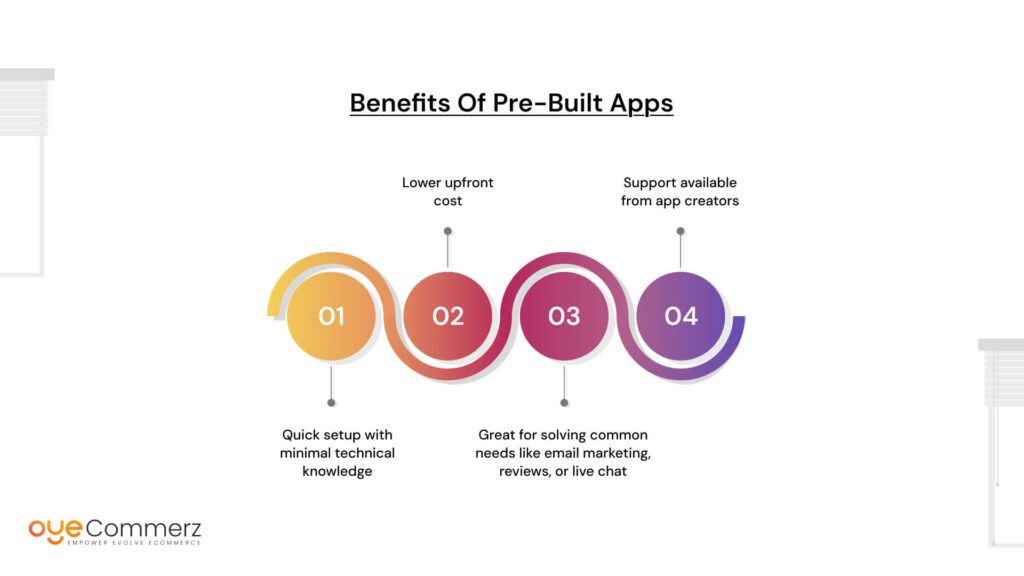
However, these plug-and-play solutions often come with limitations. As your business grows, you may hit a wall, either in functionality, flexibility, or integration. That’s where custom development becomes a smarter long-term strategy.
Let’s break it down.
Custom vs. Off-the-Shelf Apps: A Quick Comparison
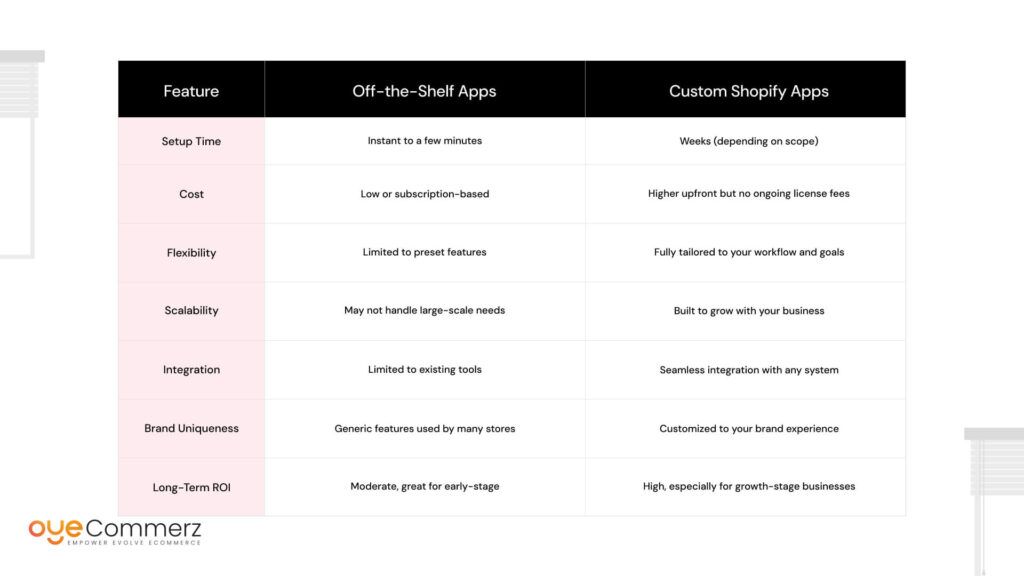
When to Go Custom?
- You need unique features not covered by any existing app
- Your operations involve complex workflows or integrations
- You’re focused on scaling and long-term growth
- You want to own and control the tech fully
While custom Shopify App Development requires an upfront investment, the payoff can be significant. You’re building an asset, not just renting a solution. A custom app aligns perfectly with your brand and business goals, helping you stand out in a crowded market.
In short, off-the-shelf works when you’re starting. But when you’re ready to lead, custom is the way forward.
How to Choose the Right Shopify App Development Partner
When selecting a partner for Shopify App Development, it’s essential to make an informed decision. A well-chosen development team can elevate your store’s functionality, while the wrong choice could lead to costly delays and dissatisfaction. Here’s how to ensure you choose the right one.
Key Qualities to Look for in a Development Team
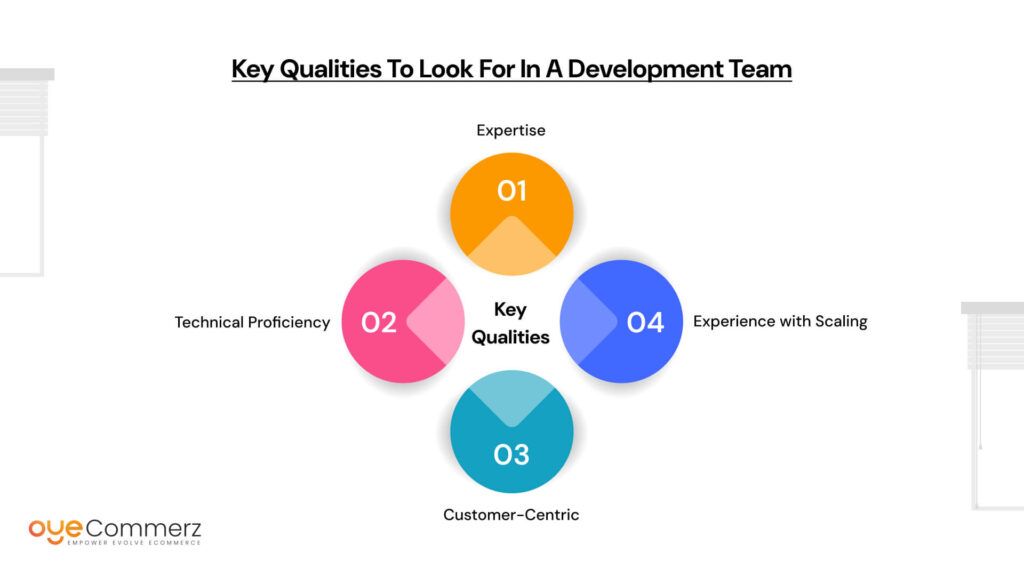
- Expertise: Ensure they have a strong portfolio of Shopify apps, particularly those that align with your business needs.
- Technical Proficiency: The team should be adept at coding, app integration, and handling custom requests.
- Customer-Centric: They should prioritize understanding your business goals and offer tailored solutions.
- Experience with Scaling: The ideal partner should have experience in building apps that can grow with your business.
Questions to Ask Before Hiring
- What’s your experience with Shopify App Development?
- Can you provide case studies or client references?
- How do you handle custom requirements?
- What is your process for post-launch support?
The Importance of Post-Launch Support
A good app partner will offer support after launch to ensure any bugs are fixed, and updates are made as needed. This ongoing relationship ensures your app evolves with your business.
Warning Signs to Avoid
- Lack of transparency in communication or pricing
- No clear understanding of your business goals
- Promises of quick turnaround without explaining the process
Selecting the right Shopify app development partner is crucial to achieving long-term success with your online store.
The Future of Shopify Apps: Trends to Watch
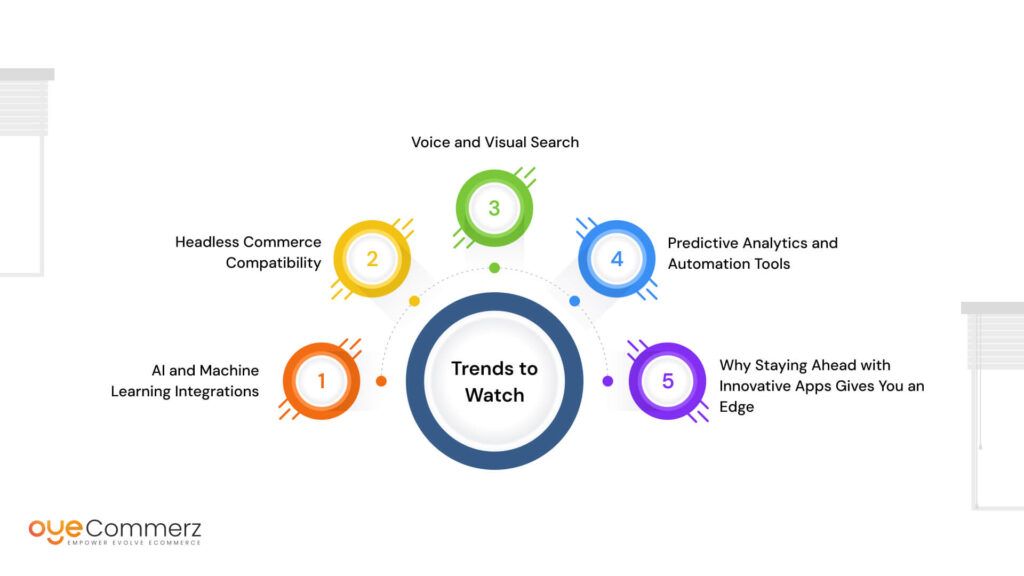
As eCommerce continues to evolve, so does Shopify. Staying ahead of the curve with innovative apps can give your store a competitive edge. Here are the top trends shaping the future of Shopify App Development.
AI and Machine Learning Integrations
Artificial Intelligence (AI) is revolutionizing customer experiences. Shopify apps that integrate machine learning are improving product recommendations, personalized marketing, and predictive inventory management. By using data-driven insights, AI can boost customer satisfaction and drive sales.
Headless Commerce Compatibility
Headless commerce separates the front-end and back-end of eCommerce platforms, allowing for more flexibility and customization. Apps that are headless commerce-compatible enable you to create unique customer experiences across multiple channels without limitations.
Voice and Visual Search
Voice and visual search are changing how consumers shop online. Shopify apps are integrating these technologies to allow users to search for products by voice or image. This enhances the shopping experience and caters to tech-savvy customers.
Predictive Analytics and Automation Tools
Apps utilizing predictive analytics can help businesses forecast demand, optimize pricing, and streamline marketing efforts. Automation tools in Shopify apps reduce manual tasks, freeing up time for business owners to focus on growth.
Why Staying Ahead with Innovative Apps Gives You an Edge
The future of Shopify apps is bright, with advanced technologies transforming the eCommerce landscape. Businesses that adopt these innovative solutions will not only stay relevant but lead the way in creating smarter, more efficient shopping experiences.
Ready to take your eCommerce business to the next level?
Unlock the full potential of your store with custom Shopify App Development by OyeCommerz. Whether you need personalized features, enhanced user experiences, or streamlined operations, we’re here to bring your vision to life.
Let’s build something great together.
Get in Touch Now
Let's build your custom Shopify app today!
Conclusion
In today’s competitive eCommerce landscape, Shopify App Development is not just an option, it’s a game-changer. Whether you’re looking to enhance customer experiences, streamline operations, or boost sales, the right apps can make all the difference. Off-the-shelf solutions may be perfect for businesses just starting out, but as you scale, custom development becomes the key to unlocking your store’s full potential.
Choosing the right development partner and staying ahead of the latest trends can propel your business to new heights. By embracing innovations like AI, machine learning, and headless commerce, you can create an adaptive and future-proof online store.
Ultimately, investing in the right Shopify apps not only drives efficiency and revenue but also helps build a brand that stands out in the crowded digital marketplace. Ready to level up your Shopify store? Start building the future of eCommerce today.
Frequently Asked Questions
Shopify apps enhance customer experience through personalized recommendations, abandoned cart recovery, and upselling tools, helping to boost conversions and increase average order value.
Custom apps are tailored to your unique business needs, offering flexibility, scalability, and features that align with your brand and long-term growth strategy.
While pre-built apps are quick to install, custom apps offer more control, better performance, and the ability to address niche business requirements effectively.
Yes, many Shopify apps automate order processing, track inventory in real-time, and streamline shipping, saving time and reducing errors.
Development costs can range from $3,000 to $30,000+ depending on complexity, features, and the level of customization required.

